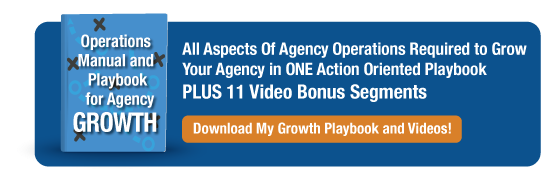 I’m not an alarmist, but I am a planner and I believe in having Plan A, Plan B and in some cases Plan C.
I’m not an alarmist, but I am a planner and I believe in having Plan A, Plan B and in some cases Plan C.
When HubSpot canceled Partner Day, it became clear, there will be an environmental impact to our businesses over the next few months, if not longer.
While I’m not suggesting anything dramatic, I am suggesting you think through the possible outcomes and be prepared. There are some very specific areas where it’s likely your agency will be impacted.
This should get you thinking constructively and allow you to make some plans whether you need them or not.
Impact On Your Team
If you’ve been considering allowing your team to work remotely, now is the time to start experimenting. Whether this was in your plans or not, it might make sense to try it out with a few people in case it becomes a mandate instead of an option.
We’ve been working remotely for years and it’s easy, but if this is the first time, expect some bumps in the road that might need to be worked out in advance.
 Start using a video conferencing too. We use Zoom at Square 2 and I use GoToMeetings for Agencies 2 Inbound. They are both excellent, affordable and easy to use. In a couple of days, your team will be right at home, no pun intended.
Start using a video conferencing too. We use Zoom at Square 2 and I use GoToMeetings for Agencies 2 Inbound. They are both excellent, affordable and easy to use. In a couple of days, your team will be right at home, no pun intended.
If you’ve never tracked time, now is the time to put those tools in place. You should have been doing this previously, but if you can’t see your team all day every day, knowing what they’re working on and how long it’s taking might give you more confidence in a remote working situation.
You might also look at how you work collaboratively. If you’re having a daily stand up in person, if you do a weekly creative meeting in person, or if your team is highly reliant on the office as a hub of activity, you should think about how you would do these meetings remotely.
I can’t stress enough that these are easy transitions to make if you’re ready to do them. If you have the tools, the set-up, mindset and the team has tried it a few times. It should be nothing at all.
For some team members, they might not have a solid set up at home. Giving them some time to find a quiet place, get it looking professional, make sure they have appropriate internet connections and a headset are all good ways to be prepared.
You might want to look at your policies. We give everyone a small stipend for working at home to cover some of the costs associated with internet, office supplies, furniture, etc. It might be a good time to think about what you do if your team is at home for a month.
In some cases, people might need some guidance on appearance and professional behavior on remote calls with clients and team members. This might seem obvious, but you should consider how you want your team dressed. I’ve seen people in baseball hats, ripped and ratty sweatshirts in rooms that look like a bomb went off. Is that OK with you?
If not, what is acceptable? What are the expectations?
.jpg?width=300&name=GettyImages-1059887920%20(1).jpg) What about children? If school is canceled, how do you feel about kids in the background while client or internal meetings are going on? What about the dog barking while you’re talking to clients about their program performance? How do you want your team handling those very common situations?
What about children? If school is canceled, how do you feel about kids in the background while client or internal meetings are going on? What about the dog barking while you’re talking to clients about their program performance? How do you want your team handling those very common situations?
If people are sick, do you have the resources to cover for them for a week or so? Even if they are remote, do you want them working while they’re sick or should they take off and recover? Every agency handles situations like this differently and now is the time to talk about it.
As owners, we want to take care of our people. Are there policies or practices you can put in place now to help your people in the event of more serious illness? Perhaps your office needs to be cleaned more frequently? Should people who are starting to feel sick stay home instead of pushing through and coming in?
There might be more to think about than you originally believed. I’m only suggesting the time to do that thinking is now.
Impact On Your Clients
It’s possible some of them will have to deal with slow downs in their business. It could be because they can’t get materials, it could be that their people are not available or it could be that their customers are seeing a more serious impact to their business.
It might make sense to go through all your clients and identify those that pose the biggest risk of slowing down or stopping work with you now.
This allows you to be proactive in making your own business decisions and it allows you to be proactive with them. Going to them with solutions to help them to continue is going to make you a partner instead of a vendor.
Showing them that they can continue to market, continue to sell, and continue to execute in a slightly different way will put you in a position to help if needed.
As an example, they may have salespeople who make in-person calls. For at least a period, they may have to move those to video calls. Again, tools, training, process and a set of adjusted communication templates can make that transition a lot easier, a lot more effective and could potentially highlight a new approach to sales for your client.
 If they rely on events, those might have to be shifted to remote, virtual or even a more active webinar program. If they were counting on a big event to drive significant lead numbers, then being proactive with them and talking about alternatives makes you a strategic necessity.
If they rely on events, those might have to be shifted to remote, virtual or even a more active webinar program. If they were counting on a big event to drive significant lead numbers, then being proactive with them and talking about alternatives makes you a strategic necessity.
This is especially true if they need your help executing tactics that they have never executed before.
Help them look at their tech stack and continue purchasing or expanding their investment in remote tools like Zoom, EventBrite and GoToMeeting. These remote hosting platforms are going to be excellent alternatives if travel or large meetings are not an option.
Look into their subscriptions and make sure they have enough seats in their licensing to allow a few hundred people to join them for a remote session. Now is the time to get those upgrades.
There could also be integration, workflow and email marketing related changes to their program that are a direct result from shifting from an in person even to a remote event using new tools. This technical work can also be something you’re able to help them with if you have enough time to proactively plan for it.
Most businesses are talking about considerations like this now and it’s time for you to be part of those conversations with your clients.
Impact on The Industry
It’s likely that additional large gatherings are going to be canceled. HubSpot has already signaled some level of responsibility and direction, which means Inbound could also be canceled or rescheduled for later in the year. Facebook has canceled events and other organizations could follow suit.
Whatever this situation turns into, it's going to be temporary. Business as usual will return and it may only be a couple of weeks or a month. It may turn out to be nothing. Your goal as an agency owner is to make sure your business can be proactive and prepared.
During the financial crisis of 2008, we had a list of 20 actions we could take if we needed. In the end, we only had to execute a small handful of the items we identified in our plan. I’m expecting this situation to be similar. We will have a plan to handle the worst-case scenario and in the end, I'm sure the impact on our business, our client’s business and our client’s customers will be less than expected.
Start Today Tip – It doesn’t cost anything to be prepared and you can’t be too prepared. The more prepared you are, the easier it is to deal with challenges as they present themselves. I think this will be a non-issue for most of us. To be prepared, go through the items above and start creating your own list of action items that can be executed. Just having a list like this should give you some piece of mind that you’re ready. While you get prepared you might find out that you don’t mind working from home, your team is more productive in a distributed model, and you can run the agency without having everyone in the same office.
Agencies 2 Inbound – Helping You Grow Your Agency Beyond Your Expectations!


